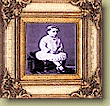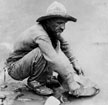

Letters Written and Received by Honorable Judge Matthew Begbie
...continued...
(Source: The Early History of Fraser River Mines. compiled by F.W.Howay. Published by John Forsyth, British Columbia Provincial Archives, Victoria 1926. Accession no.: NW 971.3 5F H853 c.6)
FORT HOPE, 14th January, 1859.lst January, 1859.
DEAR GOVERNOR,-Mr. Main, of the "Plumper,"(6) accompanied by Mr. Lewis,(7) has just arrived from Langley (where the "Plumper" is now lying) with despatches for Col Moody: among wch I find your kind note. I was afraid that you might have thought this expedition rash, looking to the time of the year, a hard frost just getting in, and (now that we have received later and, I hope, more accurate accounts) looking also to what I now very much suspect as to the temper and discretion of Captn Whannell.(8) The accounts, however, that we have heard since we left Langley have been all on the side of what may be called Mr. Ned McGowan's faction: and much as they dispose one to fancy that the unprecedented proceedings at Fort Yale may have been excited at all events by his inconsiderate and indeed illegal and oppressive conduct (if the accounts received by us here approach to accuracy), of course no judgment or opinion even can be arrived at until his side of the story be heard.
The state of intelligence however wch greeted us at Langley was such as left no option but to proceed with every available man. You have seen Captn. Whannell's letter of the 31st ulto to Capt. Grant.(9) The loose rumor flying about Langley (but wch was not credited) was that both Whannell and his Constable had been shot by McGowan: and that.the district was in open insurrection.
Col. Moody of course determined to proceed at once, leaving only the sick behind,(10) and we started at 11 p.m. the same night by the " Enterprise,"(11) wch had remained there luckily for the arrival of the "Beaver."(12)
The next day there was a good deal of ice: just below Harrison River we met Ballow's express going down: who gave us the greatest relief by intimating. that all was quiet at Fort Yale---(13) that there had been a squabble betwn the justices and that a public meeting had been called at wch a "multifarious conglomeration of heterogeneous nonsense " had been passed in the shape of resolutions. Col. Moody, however, deemed the matter, though luckily this change deprived it of its serious sanguinary aspect, as still of sufficient importance, joined to the desirability of his having a personal knowledge of the localities, to make it prudent for him to proceed in person to Fort Yale; (the river was indeed by this time frozen behind us) and asked me to accompany him. We proceeded, therefore, to the "Urnatilla snag"(14) wch we tried in vain to pass, both that day and the next: the water was too low. We therefore ran into a creek where we were shortly frozen in. This was on the 8th. Mr. Ogilvy,(15) who happened to be on board, very kindly offered to go on express to Fort Yale and bring information, and he returned on the 12th. The next day we tried the passage again, when the snow and rain had raised the water to enable us by handing out a rope to scrape over. But we could not reach beyond Murder's Bar, where we brought to for the night.(16) This morning Col. Moody and myself started in a whaleboat; but the wind and snow were so perplexing that it was 111/2 a.m. before we reached Fort Hope, after 31/2 hours: and seeing little likelihood of reaching Yale, the Col. decided on staying here all night. He thought (in wch I quite agreed) that it would have a good moral effect in bringing the soldiers here, and they accordingly marched in in 21/4 hours: but that it wod be more politic to treat the disputes at Yale as of secondary importance, place our passage up.the country entirely to motives of civil survey, and proceed alone to Yale, taking me with him. We walked about the town, therefore, examining the localities as well as we could in the snow, wch was so thick that you could not see more than a very short distance, and entered into conversation with divers settlers, miners, etc. In particular with Mr. Smith(17) and Mr. Perrier(18), who, having heard of our advent, came on from Fort Yale on purpose to tell his story first, in wch he by chance succeeded: had the weather been less atrocious, we shod have gone on to Yale without stopping here.
Mr. Smith gave us a good deal of information as to Mr. Hicks, but in a general way, wch certainly confirmed every report wch I have heard of him from every body but himself. I cannot get anybody to speak up for him. Even Mr. Edward Macgowan,(19) who does him the honour of preferring him to Capt. Whannell, alleges his reason to be because he prefers dealing with a knave rather than a fool. In particular, however, it appears to me that Mr. Hicks has been probably exceeding any reasonable limits in granting and recording rights of pre-emption and water privileges-having granted, I am informed, to one individual the exclusive water privilege of no less than 7 streams wch run into the Fraser between Hope and Yale.(20)
With Mr. Perrier Col. Moody and myself could not help being to some extent pleased. He admitted that he had committed a very gross error: but pleaded very strong provocation, wch he certainly received, according to his own story. This, however, I must wholly reserve until the other side be heard. The very long delay has, I hope, not altogether been suffered to lie idle. The bed of the river and every possible shoal has been exposed to the observation of Col. Moody and Captn. Grant in its very lowest state, under the advantage also of the remarks of Captn. Wright, of the "Enterprise," who has personally made our voyage most agreeable. We have had a good deal of conversation with miners, etc., and have had occasion from the expression of their wants to consider what general measures might be framed: wch we shall have the pleasure of submitting for your approval on our return.
As I really think it would be for the public service that I shod return immediately to Victoria, and it may be impossible to return again in time for the first Sessions or circuit web ought to be held, according to the Genl. orders of the 27th Decr.,(21) on the last Monday of this month, I have issued another order as of this date, postponing this circuit until the last Monday of February. I hope you will excuse me if I ask you to cause Mr. Pearkes (21) to be informed of this change.
Believe me
MATT. B. BEGBIE.
I am extremely glad to hear of Mr. Brew's arrival with his reinforcements. They will be more use than the Marines(23) I hope.
On second thoughts, and comparing dates, I think that I shall be able to return to Langley if necessary by the 3st inst., and therefore shall for the present, at all events, leave things as they stand.-M. B. B.
Footnotes:
(6) Lieutenant R. C. Mayne (later Commander Mayne), or H.M.S. "Pluimper" then engaged in surveying the coastal waters of British Columbia. Retired to Rear Admiral in 1879 and died in 1892. In chapter IV of his "Four Years In British Columbia and Vancouver Island," London, 1902, he gives a short account of this trouble - the so-called "Ned McGowan War."
(7)Captain Herbert George Lewis, the best-known officers of the Hudson's Bay Company, and later in command of many of the steamers engaged in the coastal trade. He was at this time acting as pilot.
(8)P. B. Whannell, resident justice of the peace at Yale.
(9)James Marshall Grant. First Captain of the detachment of Royal Engineers under the command of Colonel Moody.
(10)At that time the only Royal Engineers under Colonel Moody were Captain Parson's party of twenty men and Captain Grant's party of twelve men. Of these some twenty-five departed on this expedition.
(11) A stern-wheel, light-draught steamer, in command of Captian Thomas Wright. She was an American bottom, operating on the Fraser River under a "suferrance" issued by Governor Douglas. In the fall of 1859 the "Enterprise" was taken to Gray's Harbour, where sbe ended her days.
(12) The pioneer steam-vessel on the Pacific Coast of Canada, then still owned by the Hudson's bay Company.
(18) Ballou's Pioneer Fraser River Express, organized by William T. Ballou. "a wild waif, a hare-brained adventurer of French descent, whio since 1846 had been floating about the mountains and shores of the Pacific."
See his advertisement in Victoria, Gazette, July 28, 1858.
(14)Named after the American steamer "Umatilla," which struck it in the summer of 1858. She was the first steamer to navigate as far as Yale, which she reached on July 21. 1858.
(15)Mr Ogilvy, one of the Hudson's Bay Company's officers at Hope. A peak of the Cascade Mountains near Hope go named after him.
near ope 5 non a r In.
(16) Murderer's Bar, or Cornish Bar, about four miles below Hope.
(17) Robert T. Smith, the first Justice of the Peace and Revenue Officer at Hope, appointed in Hill's bar, 1858. Before the arrival of Judge Begbie he was one of the three commissioners who tried the first criminal case In the mining region, in September, 1858, when William King was charged with the murder of a man named Eaton and found guilty of manslaughter. He was an elected member of the Legilative Council of British Columbia in 1864; was engaged in trade in the Big Bend country, 1864-66; and was an elected member of the Legislative Council in 1867.
(18)George Perrier, the restdent Justice of the Peace at Hill's Bar, appointed In June, 1858. He had been a sallor; but was probably appointed because he was then one of the very few British subjects on Hill's Bar. He was one or the central figures to the trouble; it was the report of his arrest of Captain Whannell for contempt of Court that caused the military force to he sent up the river. An a result of the petty squabble he lost his commission.
(19)The notorious Ned McGowan.
(20) See note(17) on Hicks's correspondence.
(21) The "General Orders were not dated. See them in Governor Douglas's Proclamations.
(22) George Pearkes the Crown solicitor of Vancouver Island.
(23) Chartres Brew, of the Irish Constabulary and who had served with distinctionin the Crimean War, had been appontied by Sir E. B. Lytton to organize the police force of British Columbia. He reached Victoria on November 8, 1858. Governor Douglas, writing on January 8, 1859, to Sir E. B. Lytton, said: "I shall immediately despatch a force of 50 Marines and a body of Police, under Mr. Brew's command, to reinforce Colonel Moody party." He was a member of the first legislative Council of British Columbia; filled many guvernmeut positions; and died in harness in Cariboo.
Home | Contents | Tour | People | Collection | Transportation | Just For Kids! | Team
|
Last updated 31 August 1998. This digital collection was producedunder contract to the SchoolNet Digital Collections Program, Industry Canada. Produced by Schoolnet Digital Collections Team. |

|




